It's been a while since we've done a High 5 list, and I'll freely admit that this one's an almighty cheat. With Hana-Bi recently released on UK Blu-ray by Third Window, to be followed by Kikujiro and Dolls over the next couple of months, I thought I'd take a look back at the early films of Kitano Takeshi in his role as director, almost all of which I adore and wholeheartedly recommend. I decided initially to limit myself to selecting my five favourite films of his from the period up to and including Hana-Bi, mainly because if I was going to select from his entire filmography there was no way I could limit myself to just five. Only after I'd made that decision did it occur to me that Hana-Bi was Kitano's seventh film as director, and that selecting five films from a pool of just seven wasn't exactly a reach, and still meant excluding one I'd want to see on the list.
I thus decided to stretch the High 5 ruling to include all seven films and do something I never usually do and put them in order of personal preference. I don't like doing this for the same reason we don't have star ratings for reviews on the site, because we all find it nigh-on impossible to compare two films on a measurable scale when the things that enthral us about individual works may be completely different and thus incomparable. It suggests that opinion can be scientifically measured, which it absolutely cannot, and anyone who tells you otherwise should be soundly slapped. Add to that, opinions can and frequently do change over time – I can almost guarantee that if you ask me to redo this list five years from now, the order will have changed.
But here it is for now, a list of Kitano Takeshi's first seven films as director in my personal order of preference, counting down to my favourite with a few words on why I admire (or in one case don't get on with) each one. All are worth seeing and I'd argue that six of them should be considered essential viewing, which is why I've chosen to post this list, in the hope of prompting those who've not seen these titles to hunt them out. Of course, what we need now are Blu-ray upgrades of all the films here...
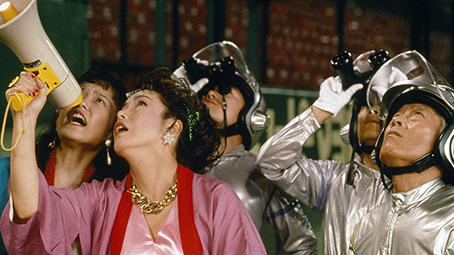
7. Getting Any? [Minnâ-yatteruka!] (1994)
The only Kitano film I've seen that I just can't get on with, this scattershot collection of uneven sketches was Kitano's first all-out comedy feature, and the one with the clearest lineage to his television work and mansai roots. How you react to it will depend largely on whether it makes you laugh or groan, and despite expecting to have a rollicking time, for most of the time I struggled to even force a smile. A cultural chasm? Perhaps, but stand the more scatological and dumbass humour here against the so much smarter situational and character comedy in his other films of the period and it really does pale. Yet nestled within the sometimes pantomime crudity and pratfall silliness, there are still a handful of inspired moments. My favourite has the film's hapless protagonist Asao attempt to demonstrate his pistol skills to a yakuza boss by shooting a hole in a tossed coin, but he catches it at the tail end of its descent and accidentally shoots one of the gang through the head in the process. When it's revealed that the dead man was actually a double agent, Asao is praised for his remarkable killer instincts. More gags of this calibre would have gone a long way here.
DVD review >>
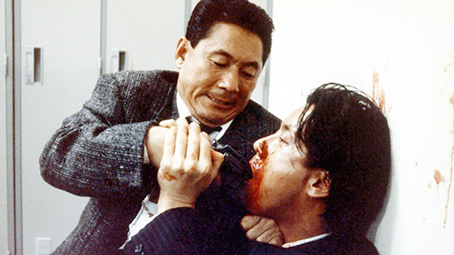
6. Violent Cop [Sono otoko, kyôbô ni tsuki] (1989)
Kitano's first stint in the director's chair came about by chance when the original director, Fukusaku Kinji (whose CV includes such gems as Battles Without Honour and Humanity and Battle Royale) vacated the position after scheduling conflicts with leading man Kitano's TV work. Although originally planned as a comedy, Kitano was keen to try his hand as a serious actor and heavily rewrote the script, transforming it into a hard-boiled tale of a maverick police detective whose violent methods put him at odds with just about everyone. Despite the fact that Kitano had never directed before and had no formal film training, his confidence and understanding of (and willingness to take chances with) the medium is clearly visible in every scene. It's a hell of a debut feature, and quite possibly the hardest film on this list for me to place, but then take a look at the titles that followed.
DVD review >>
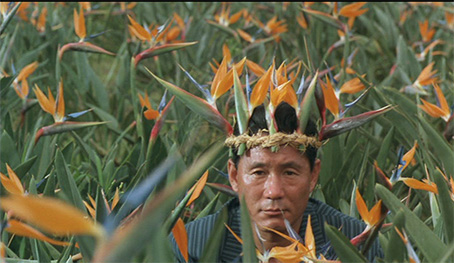
5. Boiling Point [3-4 x jûgatsu] (1990)
Takeshi may still have star billing in his second film as director, but he effectively plays a supporting role here to Yanagi Yûrei as young garage worker Masaki, who lands himself in debt to a local yakuza boss after taking a swing at one of his men. As matters complicate, the quiet Masaki and his friend Kazuo fall under the protection of a semi-psychotic yakuza bully named Uehara, played by Kitano in one of his most unsympathetic roles. It may seem a bit of a risk to cast yourself as an unpleasant shit in your second film as director, but Kitano clearly relishes the part, and although intermittently amusing in an anarchic way, Uehara really is a man you want to see beaten senseless or killed almost from the moment you meet him. He treats his girlfriend appallingly, slapping her repeatedly on the head for seemingly no other reason that it amuses him to do so, and is even more dreadful to his loyal henchman Tamagi, whom he rapes for a laugh and then cuts off his finger to present to yakuza bosses as his own as a token of gangland apology. While it doesn't feel as complete and smoothly cohesive as the films that would follow, Boiling Point is nonetheless packed to the gills with memorable scenes, inventive ideas, signature bursts of violence and offbeat humour. As such, it's the film in which you can most clearly see Kitano shaping his directorial style to come, but the process is always fascinating, artistically rewarding and hugely enjoyable, and the ending is one of the director's most enigmatic and open to multiple interpretations.
DVD review >>
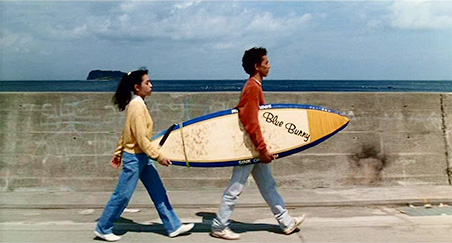
4. A Scene at the Sea [Ano natsu, ichiban shizukana umi] (1991)
When the 1999 Kikujiro was released, it bugged the hell out of me to hear so many critical voices expressing surprise that Kitano could make a film devoid of violence when all followers of his cinema knew damned well that he'd done just that way back on his third outing in the director's chair. By any measuring stick this is a bold project to take on, revolving as it does around a young deaf-mute couple who communicate through sign language that is never translated, and who effectively spend the entire film in silence. One of the purest expressions yet of Kitano's passion for visual storytelling, this tale of garbage man Shigeru and his gradual awakening to the pleasures of surfing is a gorgeously understated and emotionally involving work, and one that is more structurally complex than it first appears. Restraint is everything here, with Kitano's minimalist filmmaking perfectly suited to a story in which the lead characters do not communicate verbally, though more vocal comic support is provided by the two boys who initially mock Shigeru's efforts but end up inspired by his perseverance and following in his footsteps. It also has one of the most moving endings in all of Kitano's cinema. As a side note, I still far prefer the literal translation of the more poetic Japanese title, 'That Summer, the Quietest Sea'.
DVD review >>
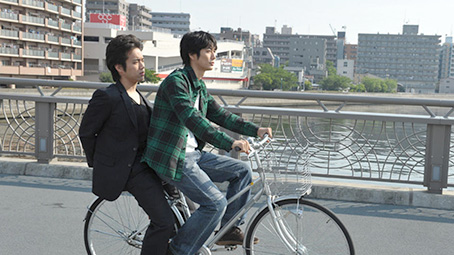
3. Kids Return (1996)
The first film directed by Kitano following the 1994 scooter accident that left him with partial paralysis saw him turn his camera on his own life in a film in which he chose not to appear. The story of troublesome high school drop-outs Masaru and Shinji, one of whom pursues a career in boxing whilst the other finds work with the local yakuza gang, appears to have been drawn partially from Kitano's own youth, while glimpses of the direction his life would actually take are provided by two students who are intermittently observed developing their own mazai comedy routine. Kitano's fondness for base humour finds its most creative and side-splittingly funny outlet here in the shape of the constructed mannequin that Masaru and Shinji dangle from the roof to disrupt a class, and his before/after editing delivers a priceless gag involving a teacher's new car, one that simply wouldn't have worked had we been shown the act the the edit bypasses. Crucially, we end up caring deeply about Masaru and Shinji's fate because, more than any of the characters in Kitano's previous films, they feel so real. A touching, thoughtful and very personal work whose balance of drama, humour, violence and personal reflection is absolutely spot-on.
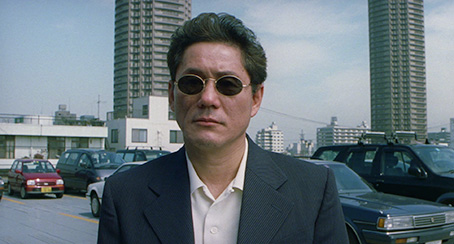
2. Hana-Bi [Fireworks] (1997)
Kitano's first stint in front of his own camera following his accident doesn't so much try to work around his partial facial paralysis as make a virtue of it. As the initially inexpressive Detective Nishi, Kitano is at his icy-cool best here, but what begins as a crime drama develops into a very personal and deeply moving study of love, loss and commitment to friends and loved ones. All of Kitano's previous experiments with form, storytelling and editing come together exquisitely, and the film has an emotional depth and affection for its lead characters that's easily on a par with the more openly autobiographical Kids Return. There's not a wasted frame here nor a scene that feels hurried or a second too long. It all works divinely, and would occupy the top spot were it not for...
Blu-ray review >>
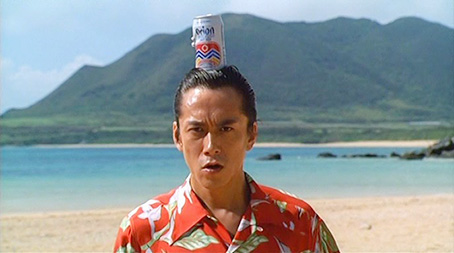
1. Sonatine (1993)
Just what is it that makes this off-the-wall yakuza gangster tale such a mesmerising and richly satisfying experience? I could list all the things that I love about it, but that still wouldn't explain the unique spell it seems to cast over a sympathetic audience. I can't remember who it is that said of Stephen King's Cujo that any writer could terrorise a woman and child with a rabid St. Bernard, but it took someone of King's singular gift to have the animal keep them trapped in their car for most of the novel. Similarly, any filmmaker could send a group gangsters to hide out at a remote seashore spot, but it takes a man of Kitano's vision to keep them there for the entire second half of what starts out as an action peppered crime movie. But it's here that the film really weaves its magic, as a good-natured group of gangsters looks for ways to pass the time and stave off boredom, with activities that include costumed geisha dances, night-time firework fights and playing William Tell with a beer can and pistol. The best of the lot is a surrealistic sequence in which they stage a sumo wrestling match by imitating the cardboard characters of a home-made toy version of the same, and are moved around the sand by vibrations generated by their companions rhythmically banging the ground around them, all to the glorious strains of one of Joe Hisaishi's finest scores. It's a sublime piece of cinema that's desperately in need of a quality Blu-ray release, one without the inaccurately (and inappropriately) expletive-littered subtitles created for the US release on Tarantino's Rolling Thunder label.
|